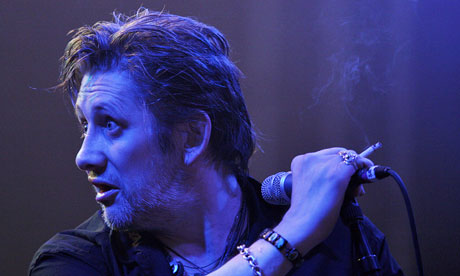
Last year, the interiors magazine Livingetc offered its readers a feature on Christmas decorations. One suggestion was that they fix a chalkboard sticker to the wall and write festive lyrics on it. In the accompanying photograph, the lyrics came from the Pogues' "Fairytale of New York".
Twenty-five years after its first release, "Fairytale of New York" is a beloved, unavoidable festive institution. But as accordionist James Fearnley's memoir makes clear, there was a time when the notion of the Pogues becoming a beloved Christmas institution would have seemed bizarre, even slightly terrifying.
By 1985 the Pogues were already famous, and not merely for their apparently perpetual state of alcoholic dissipation: depending on who you believed, their chaotic updating of Irish music was either reviving the spirit of punk or singlehandedly reinvigorating a moribund folk tradition (or wilfully desecrating it). Their gigs were riotous, sometimes literally. Backstage in Carlow, Fearnley found his impassioned complaints about the audience's brawling cut short by frontman and chief songwriter Shane MacGowan (pictured) delivering him a lecture on human nature. "People are just this much away from murdering each other, raping one another, knifing, shooting, massacring, garotting," he snaps. "It's what they want to do and … they're going to do it anyway no matter how much fucking whingeing you do."
Fearnley was baffled. How, he wonders, could a man who professed such contempt for humanity write songs "so full of chastening pity for the human condition"? But then, Fearnley seems to have been baffled by MacGowan from the moment he met him – at an audition for pre-Pogues band the Nips – to the moment the singer becomes so unmanageable that Fearnley and the rest of the band wearily fire him in a hotel room in Japan.
It makes for a slightly odd book. The Pogues were overburdened with fascinating characters, who would have been the star turn in a memoir of any other band: tormented gay guitarist Philip Chevron; MacGowan's roguish sidekick Spider Stacey; teenage bassist Caitlin O'Riordan. But as a central figure, MacGowan is simultaneously vivid and utterly elusive.
Occasionally, you feel a discreet veil is being drawn. Fearnley makes clear that MacGowan is a deeply troubled man, so beset by nameless demons that he is "condemned to wakefulness". But beyond a few vague remarks about his childhood in Ireland "not always being happy", he gives no indication as to what the problem might be. Nor does he offer any explanation for an apparently dramatic deterioration in MacGowan's mental health during the late 80s, which left the singer, to all intents and purposes, unable to record or perform live, although a contemporary feature by Nick Kent suggested the problem might have been linked to MacGowan adding vast quantities of LSD to his already groaning smorgasbord of intoxicants. "Eight or nine tabs at a time, every day … one big fucking nightmare," offered the band's manager, Frank Murray.
More often, however, he seems to be authentically baffled: by MacGowan's suicidal drinking and his remarkable constitution. The descriptions of his squalid living conditions are astonishing: no subscriber to Livingetc he. Furthermore, Fearnley is at a loss to explain the astonishing burst of songwriting creativity that fuelled the Pogues' first three albums. One minute MacGowan is wildly suggesting they form a band to play "Cretan music" while dressed as Roman gladiators ("It'll be well sexy," he offers, unconvincingly), the next he's suddenly come up with the idea of the Pogues and a tape containing most of the songs that made them famous. His capacity to write remarkable lyrics and indelible melodies seems to materialise overnight, then dematerialise just as quickly a few years later. "A stable perception was never reachable," Fearnley admits, "as to whether Shane was a genius or a fucking idiot."
Still, there are other reasons to enjoy Here Comes Everybody. Fearnley is brilliant at conjuring the milieu from which the Pogues sprang, a lost, down-at-heel demimonde of King's Cross squats and housing association flats. If he can't or won't tell you why MacGowan's decline occurred, he describes it in harrowing detail: the screaming fits, the vomiting, his skin "the colour of grout". Fearnley was a frustrated novelist when the Pogues formed, which rather shows. He has a great eye for detail, but he also has a touch of the epiphenomenal imbroglios: "we listened to the muffled crepitations coming from inside"; eyebrows "plicate" foreheads.
The Pogues were certainly of a literary bent, but equally, they wore their learning lightly. All the plicating and muffled crepitations do jar a little with a band who featured in their line-up a man who kept time by repeatedly hitting himself over the head with a metal beer tray. In another sense, however, Fearnley's book fits perfectly with the Pogues: for all their earthiness, they were a band concerned with myths, from the Irish legends MacGowan's lyrics relocated to the back streets and pubs of north London to the persistent rock'n'roll fable of the damned, beautiful loser. There's nothing romantic about alcoholic self-destruction, as Here Comes Everybody makes clear, but a song as beautiful as "A Pair of Brown Eyes" can make you believe there is – at least while it's playing. In the process, MacGowan became a mythic figure himself: a myth, despite the unsparing detail that Fearnley ends up burnishing.

